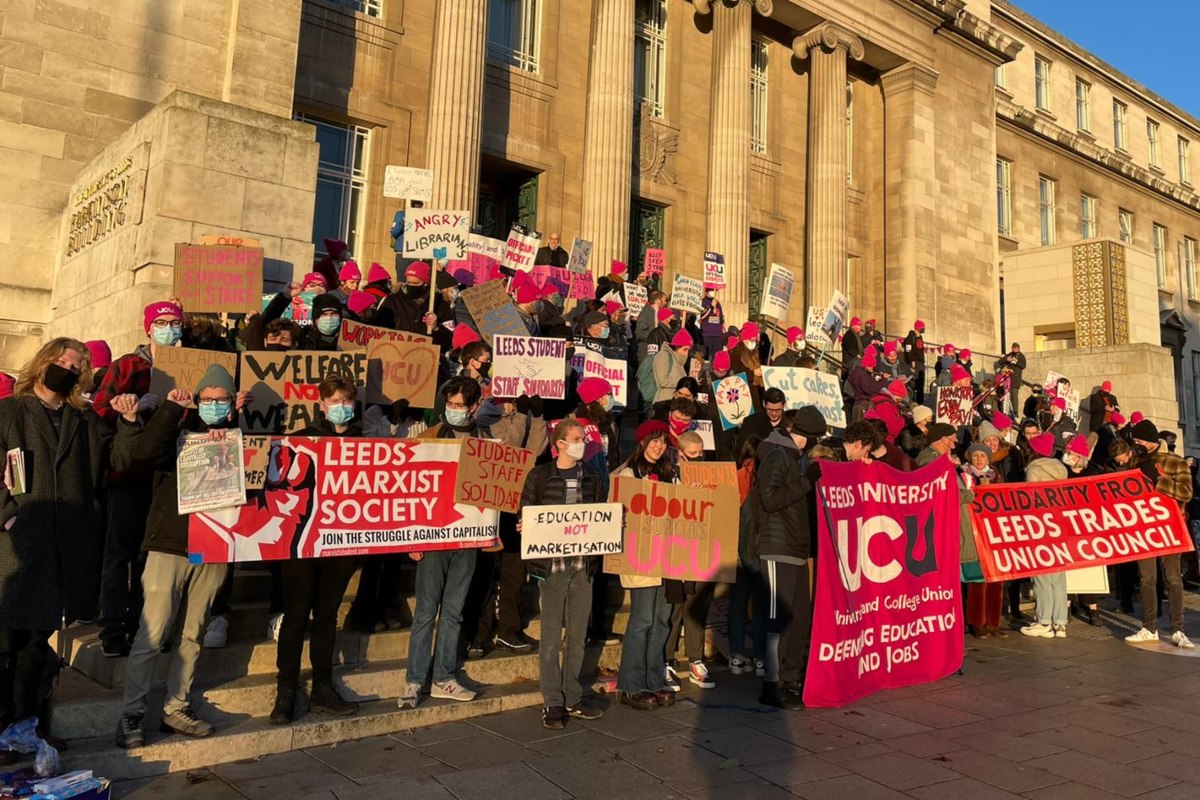With university budgets squeezed, education bosses are slashing courses and jobs at institutions across the country. At the same time, campus unions are mobilising to defend pay and conditions. Workers and students: unite and fight!
With the UK economy heading towards recession, and a new cohort of freshers set to hit the country’s campuses, the Tory government has taken aim at university funding with their war on ‘dead-end degrees’. In reality, this is a war on working-class access to higher education (HE).
In the wake of the retreat by the Universities and Colleges Union (UCU) earlier this year, education bosses have gone on the attack.
Roehampton University has confirmed that it is scrapping 19 courses across the arts and humanities, for example, forcing 100 academics to reapply for their jobs. Elsewhere, Wolverhampton University has announced the closure of their School of Performing Arts, ‘pausing’ 47 courses and axing 250 jobs.
At Queen Mary University of London (QMUL) – where staff have faced 100% pay deductions for participation in the national marking boycott – senior management have threatened striking staff with the closure of the film studies programme.
The attacks show no sign of slowing, with closure announcements at Goldsmiths, De Montfort, Sheffield Hallam, Dundee, Bishop Grosseteste, and more.
Marketisation

To understand what is driving these closures, we need to look at the economics of higher education. This leads us to the Office for Students (OfS) – the government body in charge of distributing state funding for universities and colleges.
Since the passing of the 2017 Higher Education and Research Act, the OfS has been mandated to “encourage competition between English higher education providers”, and to promote “value for money”.
In other words, it has been transformed into a weapon by which the government can push through the marketisation and privatisation of the sector, cutting state funding to the bone with each attack.
These cuts come at a time when capitalism – in Britain, and worldwide – is in a deep crisis. Although the wealth clearly exists to properly fund decent quality education for all, it is in the wrong hands.
Instead of touching the profits and accumulated wealth of the capitalist class, everyone else is being forced to pay for the crisis of capitalism through austerity and attacks on their jobs.
University bosses, anxious about funding losses, have been calling on the government to intervene, as they see the real value of tuition fees has fallen with inflation.
Crying crocodile tears, Russell Group universities claimed in 2020 that they were making a loss of £1,750 a year teaching each home student, due to fees remaining static. However, these unis went on to make a £2.2 billion cash surplus in the 2020/21 financial year.
In reality, the bosses weren’t asking the government to save their institutions – they were asking it to save their profits!
This is the result of a marketised education sector, where institutions compete against each other. Here, there is no incentive to invest in workers or subsidise students, nor to invest in a rich education that benefits society.
Instead, every minute of labour must be squeezed from overworked staff. Every penny must be wrestled from impoverished students. And any reinvestment will only go towards ‘safe’ investments: either in real estate, or into courses that attract overseas students who have no cap on their fees.
Everything else must be sacrificed on the altar of profit.
Cuts
In 2021, the OfS approved the cutting of 50% of arts courses funding, redirecting it into STEM (science, technology, engineering and mathematics) subjects. Thus the government gave the green light to the bosses’ turn towards investing in courses that attract overseas students.
Alongside this, the OfS also cut full-time arts students’ subsidies from £243 to £121, moving £20 million off the government’s debt and onto the back of students. The hardest hit were those working-class students who depend wholly on the subsidy for their materials.
This policy triggered a wave of ‘restructurings’ and closures. Vice-chancellors had the nerve to tell staff this was all ‘for their own good’, whilst they lined their own pockets with bonuses for a job well done.
2021 saw the closure of archaeology at the University of Sheffield, English at the University of Cumbria, modern languages at the University of Hull, Commonwealth studies at the Institute of Latin American Studies in the University of London (which had already closed its drama centre), and history and languages at Aston University.
These are but a few of the courses and departments closed so far. Going into the 2021/22 academic year, the sector had lost dozens of courses, and hundreds of jobs, primarily in the arts.
Nadhim Zahawi – the two-day pop-up Chancellor of the Exchequer – pushed these attacks further when he took on the role of education secretary in September 2021. With the Tories frantically searching for more budget cuts, Zahawi answered with his crackdown on ‘low-value courses’, as a means of further pulling funding from universities.
This began in January this year with the OfS launching a consultation on new ‘minimum acceptable’ standards. The new rules under this consultation threaten to remove funding for courses where fewer than 75% of undergraduates complete their courses, or where fewer than 60% are in ‘highly skilled’ jobs, or studying for a further degree within 15 months of graduating.
Notably, the University of Wolverhampton had the highest number of subjects judged to be ‘low value’ according to these criteria, and is now facing the largest number of course closures.
Unsurprisingly, working-class students will be most affected by these course cuts. Those from rich backgrounds, meanwhile, will find their access to the most prestigious institutions largely unaffected. This is the inevitable logic of the market when applied to education.
Attacks

The government and university VCs have been lying through their teeth, claiming that there is no connection between course closures and this Tory policy. Instead, they state that they are doing what is best for staff and students.
Socialist Appeal interviewed staff at Sheffield Hallam University, who provided a very different picture.
Hallam staff were told – without warning – that eighteen courses were going to be closed either this or next year.
Unbeknownst to staff, consultants DataHE had been brought in by senior management to conduct a ‘size and shape review’ – that is, to magic up some figures that would legally justify a round of closures and redundancies.
Instead of investing in staff, Hallam is pushing ahead with its campus redevelopment plan. The first phase plan alone will cost over £200 million for three buildings.
According to the Hallam teaching staff we spoke to, department heads were given the results from DataHE’s analysis, and were told to make an announcement of changes as soon as possible. Line managers, admin, and teaching staff were therefore left out of the process.
Students likewise have been given no insight into the unfolding chaos. In fact, English literature students received a terse email informing them not to worry about what they read in the news!
Amongst the staff, there are obvious fears of redundancies, especially with so many on temporary contracts. Indeed, management’s words of reassurement mean little-to-nothing to staff who were only offered an insulting £250 to settle the national Four Fights dispute, over the decade of degradation of pay, working conditions, contracts, and equality.
Chris Husbands, the Hallam VC, stated that the purpose of these closures (let’s call them what they are!) are to “re-energise our humanities offerings”. Yet these closures have been so top-down, so out of the blue, and so aggressive, that a number of staff we spoke to are now planning to tender their resignations. What a wave of re-energisation!
Fightback

The same picture is now faced by post-92 universities across the country. It amounts to a wholesale attack on access to education for working-class students, as well as to the jobs and conditions of the thousands of staff at these institutions.
This war on education must be fought tooth and nail by the labour movement.
Unions in the education sector need to learn the lessons of this year’s UCU strikes and come forward with a bold, militant campaign – coordinated with unions across the sector – with one clear goal: the complete reversal of the marketisation and privatisation of higher education.
Already, Unison members at 22 universities are set to strike over a pathetic below-inflation pay offer. And yesterday saw the beginning of national ballots covering UCU members at 150 HE institutions across the country, which could lead to UK-wide action over pay, conditions, and pensions.
This points the way forward, paving the way for possible coordinated action between the unions – both within universities, and across the entire public sector.
But at this point we cannot limit ourselves to just treating the symptoms of the marketisation of education. Universities run for profit will never subsidise working-class education; nor will they pay their staff a decent wage. Instead, the bosses will abandon both at the first chance they get.
Therefore the struggle to save education must explicitly be linked with the struggle for socialism – and for the funding of free education through the expropriation of the billionaires.
Only when society’s wealth and resources are publicly-owned and democratically run in the interests of ordinary workers and youth can we properly fund high-quality, lifelong education for all.



